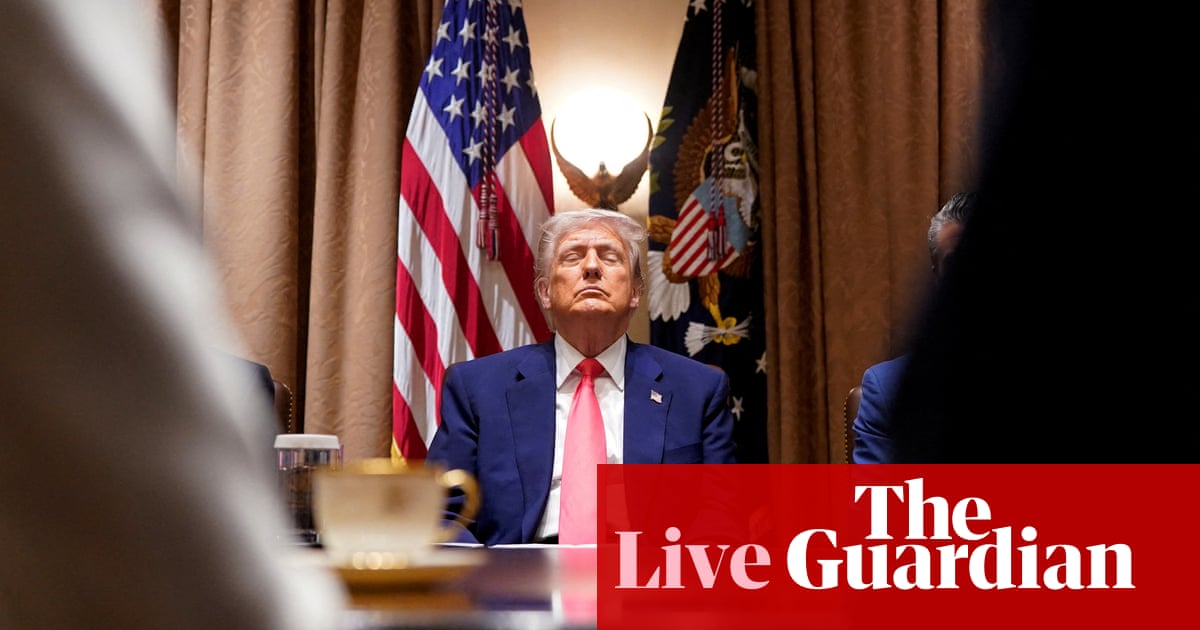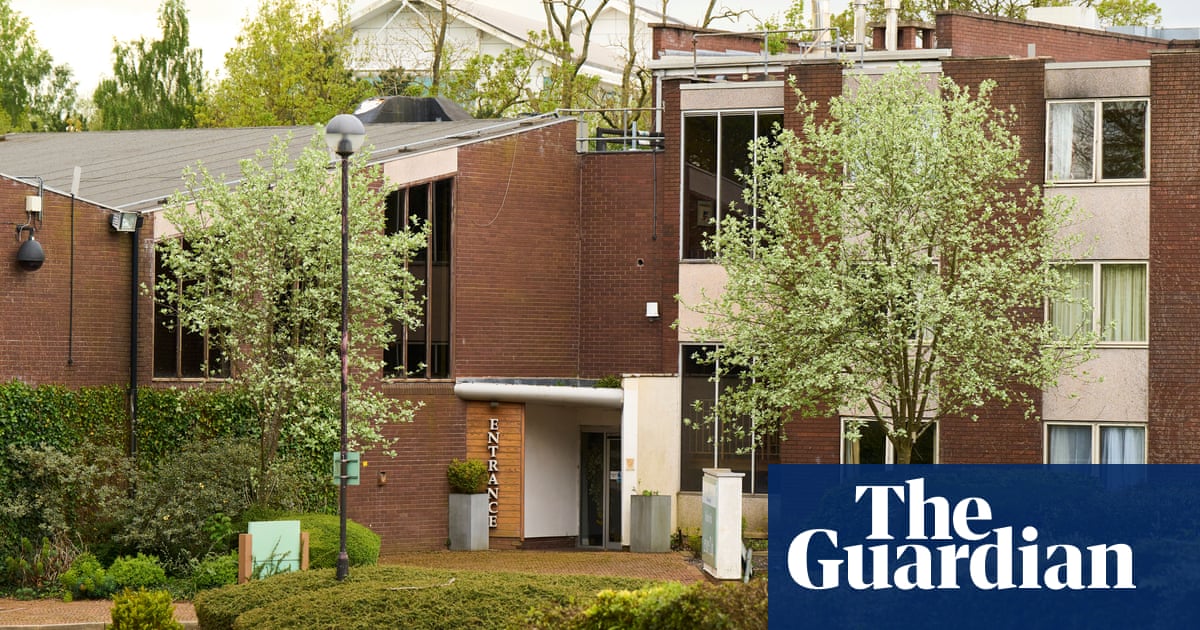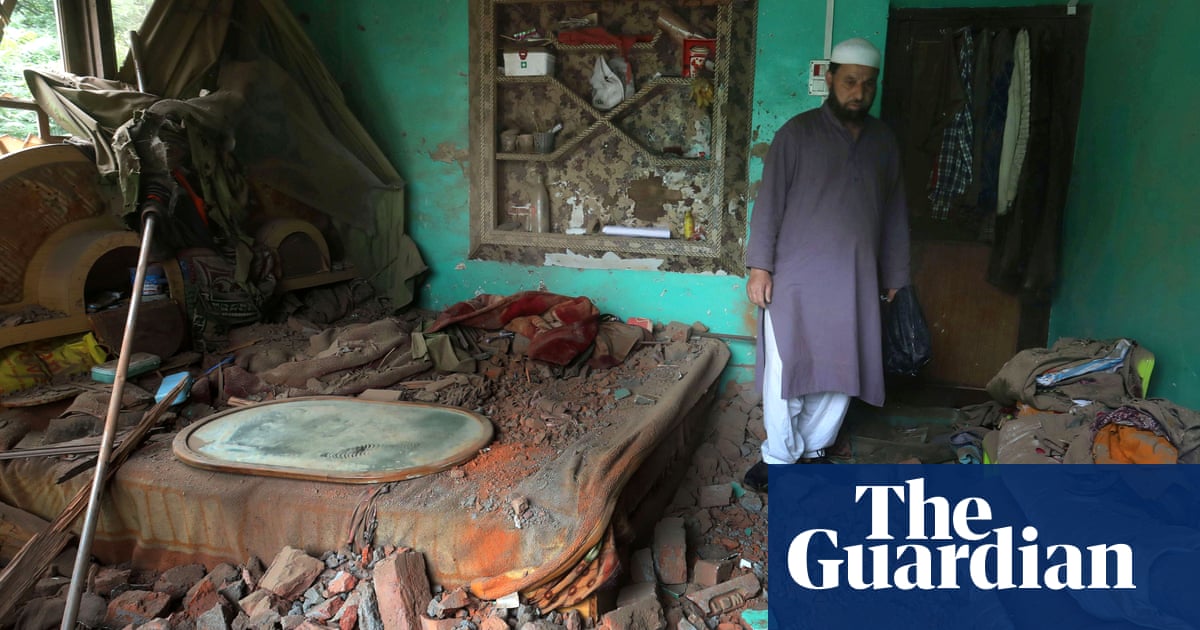‘We’re in very good shape’: Trump dismisses tariff turmoil as ‘transition problems’
Donald Trump defended his tariff policies at a cabinet meeting on Thursday, while warning that there may be a “transition cost”. The president said:
We think we’re in very good shape. We think we’re doing very well. Again there will be a transition cost, transition problems, but in the end it’s going to be a beautiful thing.
We’re doing, again, what we should have done many years ago. We let it get out of control, and we allowed some countries to get very big and very rich at our expense. And I’m not going to let that happen.
His comments come as former US treasury secretary Janet Yellen called Trump’s economic policy the “worst self-inflicted wound” an administration has imposed on an otherwise well-functioning economy.
Key events
The Trump administration is considering placing Columbia University under a consent decree, according to a report by the Wall Street Journal. The decision would mark a major escalation in the federal government’s crackdown on the Ivy League institution.
My colleague Lauren Gambino has more:
A federal judge has ruled that the Trump administration can require all people in the country without authorization to register with the federal government.
In a decision issued today, Judge Trevor Neil McFadden sided with the government. The requirement will go into effect Friday.
The news comes as the Trump administration is ramping up its efforts to force immigrants to “self-deport”. The New York Times reports that the administration is also working to effectively cancel the Social Security numbers of immigrants with legal status.
A day after the interior department announced sweeping planned layoffs, the agency has fired its top technology and cybersecurity leadership, Government Executive reports. The news comes after department leaders refused to grant the so-called “department of government efficiency” access to a federal personnel and payroll system.
Yesterday, interior department announced plans to consolidate and eventually lay off up to 50% of employees in IT, communications, finance, human resources and contracting departments.
Ahead of planned talks with Iran this weekend, the United States has imposed additional sanctions on the nuclear power’s “shadow fleet”.
The Trump administration imposed economic sanctions on the United Arab Emirates-based Indian national owner of several firms that transport Iranian oil illegally. The treasury department says Jugwinder Singh Brar’s ships transfer Iranian oil in the waters off Iraq, Iran, the UAE and the Gulf of Oman.
“The Iranian regime relies on its network of unscrupulous shippers and brokers like Brar and his companies to enable its oil sales and finance its destabilizing activities,” the treasury secretary Scott Bessent said.
Secretary of state Marco Rubio says the government can deport Palestinian activist Mahmoud Khalil for his “beliefs”.
In response to a judge’s request for evidence, the government submitted a two-page memo, signed by Rubio, in which it argues that the Trump administration may deport noncitizens whose “beliefs, statements or associations” represent a threat to US foreign policy interests.
Khalil is deportable because of “beliefs, statements or associations” that would compromise US foreign policy interests, the Associated Press and CNN report. the memo does not allege any criminal conduct by Khalil, a legal permanent resident who was detained last month after serving as a spokesperson for Columbia student activists protesting the war in Gaza.
The memo came just hours after Rubio spoke at a Trump administration Cabinet meeting earlier today, where he promised to revoke student visas from “lunatics”.
“If you come here to vandalize a library, take over a campus, and do all kinds of crazy things, we’re going to get rid of these people and we’re gonna continue to do it,” he said.
Immigrations and Customs Enforcement has deleted a social media post it shared earlier today saying that it is responsible from stopping illegal “ideas” from crossing the US border.
The news comes as immigration officials have denied entry or detained a growing number of people for their political views, including pro-Palestinian student protesters and a French scientist who was blocked from entering the US after immigration officers found messages in which he had expressed criticism of the Trump administration on his phone.
“That post was sent without proper approval and should not have been shared,” a Department of Homeland Security spokesperson Tricia McLaughlin told CNN. “‘Ideas,’” she added should have said “‘intellectual property’” instead.
As the New York Stock Exchange closes today, the S&P 500 is down 3.5%. The Dow Jones Industrial Average fell 2.5%, and the Nasdaq dropped 4.3%.
My colleagues Anna Betts and Lauren Aratani report:
The falls came as the president blamed “transition problems” for the market reaction and the sell-off deepened after a White House clarification noted that total tariffs on China had been raised by 145% since Trump took office.
US stocks fall again after rally following Trump’s shock retreat on tariffs
Anna Betts and Lauren Aratani in New York
US stocks fell again on Thursday morning after a historic rally following Donald Trump’s shock retreat Wednesday on the hefty tariffs he had just imposed on dozens of countries.
The falls came as the president blamed “transition problems” for the market reaction and the sell-off deepened after a White House clarification noted that total tariffs on China had been raised by 145% since Trump took office.
Speaking at the White House, Trump said:
We think we’re in very good shape. We think we’re doing very well. Again there will be a transition cost, transition problems, but in the end it’s going to be a beautiful thing.
The sell-off comes as Democrats continue to react with anger over the sudden retreat that rattled markets, while Republicans praised Trump’s “art of the deal” in action, referencing Trump’s 1987 book.
The Dow was down 5% on Thursday morning after soaring on Wednesday afternoon. The Nasdaq Composite was down over 4% and the S&P 500 down over 3.5% after jumping over 8% and 5% on Wednesday, respectively.
The market seems to be in a state of fatigue after a rollercoaster week. Stocks were even unresponsive to news on Thursday morning that the European Union announced it will suspend 25% retaliatory tariffs against US imports and new data showed inflation in the US cooled to 2.4% in March – both would typically be cause for optimism on Wall Street.
On CNN, former US treasury secretary Janet Yellen called Trump’s economic policies the “worst self-inflicted wound” an administration had ever imposed on a “well-functioning economy”.
The day so far
Donald Trump defended his tariff policies at a cabinet meeting, saying, “We’re in great shapes,” while warning that there may be a “transition cost”. He said: “We think we’re in very good shape. We think we’re doing very well. Again there will be a transition cost, transition problems, but in the end it’s going to be a beautiful thing.” Meanwhile, former US treasury secretary Janet Yellen called Trump’s economic policy the “worst self-inflicted wound” an administration has imposed on an otherwise well-functioning economy. More on our business live blog.
Meanwhile, the president’s abrupt global tariff U-turn has sparked accusations of market manipulation and insider trading. Shortly after US markets opened on Wednesday morning, Trump wrote on his social media platform Truth Social: “THIS IS A GREAT TIME TO BUY!!! DJT.” His post – and its timing – is referenced in a letter from Democratic senators demanding on investigation into whether anyone in the Trump family or administration has profited from the recent tariff chaos through insider trading. As an example of concern, the senators highlight that Elon Musks’s Tesla gained 18% in value immediately following Trump’s announcement of a 90-day pause on tariffs for most countries.
In better news for the Trump administration, the House speaker, Mike Johnson, was finally successful in muscling through a multitrillion-dollar budget framework that paves the way for Donald Trump’s “big, beautiful bill”, just a day after a rightwing rebellion threatened to sink it. Despite the rocky road to passing the blueprint, that was the easy part. Now Republicans in both chambers need to come together to actually write the legislation and lay out the spending cuts they have promised to pay for the plan. Johnson has insisted that it’s possible to achieve the savings without major cuts to “essential programs” such as Medicaid. But budget experts and Democrats say the scale of the GOP’s cost-cutting goals makes it nearly impossible to achieve without significant reductions to critical programs and services.
Elsewhere:
-
The US ambassador to Ukraine, Bridget Brink, is stepping down from her role, a state department spokesperson has told Reuters, in a move that injects new uncertainty into the relationship between Washington and Kyiv.
-
The Trump administration said it will no longer require environmental impact statements for oil and gas leases across the US west, in a step toward lifting green hurdles to drilling that environmental groups will probably challenge in court.
-
The US defence secretary, Pete Hegseth, floated the idea of US troops returning to Panama to “secure” its strategically vital canal, a suggestion quickly shot down by the Panamanian government.
Health secretary Robert F Kennedy Jr claims US will know cause of autism epidemic by September
The government will identify the cause of autism by September this year, the US secretary of health and human services, Robert F Kennedy Jr, said on Thursday.
“At your direction, we are going to know by September. We’ve launched a massive testing and research effort that’s going to involve hundreds of scientists from around the world,” Kennedy said at a meeting of Donald Trump’s cabinet earlier.
“By September, we will know what has caused the autism epidemic and we’ll be able to eliminate those exposures.”
Trump in February ordered the creation of a “Make America healthy again” commission made up of Kennedy and other secretaries to look at everything from the rates of autism and asthma in children to how much medicine is being prescribed to them for ADHD or other conditions.
Autism diagnoses in the United States have increased significantly since 2000, intensifying public concern. Scientists have been researching for decades what genetic or environmental factors might contribute to autism, but the causes of most cases remain unclear.
They say that the major drivers of the increase in US autism rates are an expanded definition that includes more types of behaviors and more widespread awareness and diagnosis.
Kennedy has long promoted a debunked link between vaccines and autism despite scientific evidence to the contrary.
The Centers for Disease Control and Prevention says many studies have looked at whether there is a connection between vaccines and autism and “to date, the studies continue to show that vaccines are not associated with” autism.










